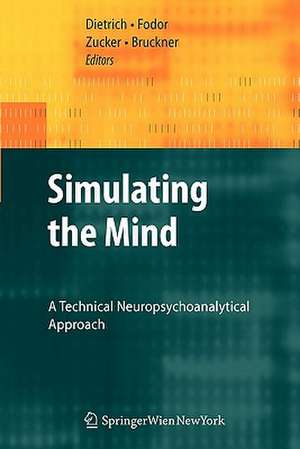Simulating the Mind: A Technical Neuropsychoanalytical Approach
Editat de Dietmar Dietrich, Georg Fodor, Gerhard Zucker, Dietmar Bruckneren Limba Engleză Paperback – 13 oct 2010
Artificial Intelligence has tried to implement functions of human psyche. The reached achievements are remarkable; however, the goal to get a functional model of the mental apparatus was not reached. Was the selected direction incorrect?The editors are convinced: yes, and they try to give answers here. If one accepts that the brain is an information processing system, then one also has to accept that computer theories can be applied to the brain’s functions, the human mental apparatus.
The contributors of this book - Solms, Panksepp, Sloman and many others who are all experts in computer design, psychoanalysis and neurology are united in one goal: finding synergy in their interdisciplinary fields.
| Toate formatele și edițiile | Preț | Express |
|---|---|---|
| Paperback (1) | 994.92 lei 6-8 săpt. | |
| SPRINGER VIENNA – 13 oct 2010 | 994.92 lei 6-8 săpt. | |
| Hardback (1) | 1004.00 lei 6-8 săpt. | |
| SPRINGER VIENNA – 13 oct 2008 | 1004.00 lei 6-8 săpt. |
Preț: 994.92 lei
Preț vechi: 1243.64 lei
-20% Nou
Puncte Express: 1492
Preț estimativ în valută:
190.44€ • 206.93$ • 160.07£
190.44€ • 206.93$ • 160.07£
Carte tipărită la comandă
Livrare economică 22 aprilie-06 mai
Preluare comenzi: 021 569.72.76
Specificații
ISBN-13: 9783211998694
ISBN-10: 3211998691
Pagini: 456
Ilustrații: XVII, 436 p. 63 illus.
Dimensiuni: 155 x 235 x 24 mm
Greutate: 0.64 kg
Ediția:Softcover reprint of hardcover 1st ed. 2009
Editura: SPRINGER VIENNA
Colecția Springer
Locul publicării:Vienna, Austria
ISBN-10: 3211998691
Pagini: 456
Ilustrații: XVII, 436 p. 63 illus.
Dimensiuni: 155 x 235 x 24 mm
Greutate: 0.64 kg
Ediția:Softcover reprint of hardcover 1st ed. 2009
Editura: SPRINGER VIENNA
Colecția Springer
Locul publicării:Vienna, Austria
Public țintă
ResearchCuprins
Theory.- The Vision.- Basics.- Model.- Implementation and Application.- Proceedings of Emulating the Mind (ENF 2007).- Session 1.- Session 2.- Session 3.- Session 4.- Discussion Sessions.- Responses to the ENF 2007.- Introductory Words.- Collected Papers.
Textul de pe ultima copertă
Can psychoanalysis offer a new computer model? Can computer designers help psychoanalysts to understand their theory better?In contemporary publications human psyche is often related to neural networks. Why? The wiring in computers can also be related to application software. But does this really make sense?
Artificial Intelligence has tried to implement functions of human psyche. The reached achievements are remarkable; however, the goal to get a functional model of the mental apparatus was not reached. Was the selected direction incorrect?The editors are convinced: yes, and they try to give answers here. If one accepts that the brain is an information processing system, then one also has to accept that computer theories can be applied to the brain’s functions, the human mental apparatus.
The contributors of this book - Solms, Panksepp, Sloman and many others who are all experts in computer design, psychoanalysis and neurology are united in one goal: finding synergy in their interdisciplinary fields.
Artificial Intelligence has tried to implement functions of human psyche. The reached achievements are remarkable; however, the goal to get a functional model of the mental apparatus was not reached. Was the selected direction incorrect?The editors are convinced: yes, and they try to give answers here. If one accepts that the brain is an information processing system, then one also has to accept that computer theories can be applied to the brain’s functions, the human mental apparatus.
The contributors of this book - Solms, Panksepp, Sloman and many others who are all experts in computer design, psychoanalysis and neurology are united in one goal: finding synergy in their interdisciplinary fields.
Caracteristici
Includes supplementary material: sn.pub/extras

















